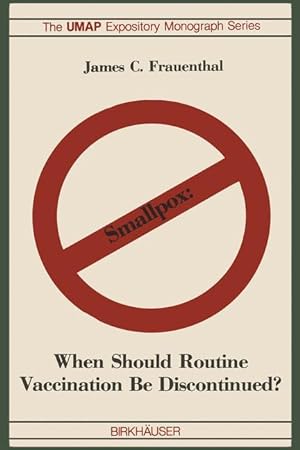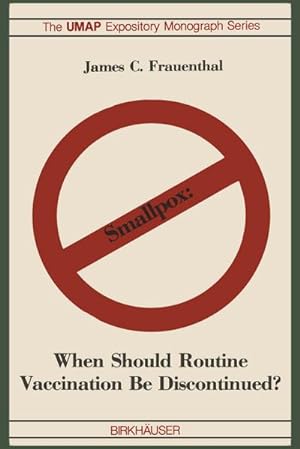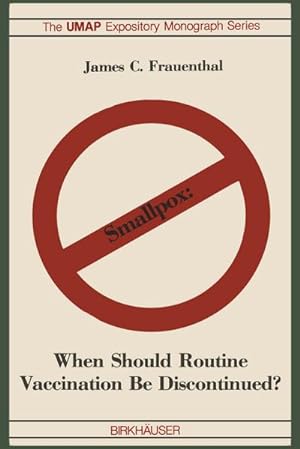smallpox when routine vaccination (8 risultati)
Filtri di ricerca
Tipo di articolo
- Tutti i tipi di prodotto
- Libri (8)
- Riviste e Giornali (Nessun altro risultato corrispondente a questo perfezionamento)
- Fumetti (Nessun altro risultato corrispondente a questo perfezionamento)
- Spartiti (Nessun altro risultato corrispondente a questo perfezionamento)
- Arte, Stampe e Poster (Nessun altro risultato corrispondente a questo perfezionamento)
- Fotografie (Nessun altro risultato corrispondente a questo perfezionamento)
- Mappe (Nessun altro risultato corrispondente a questo perfezionamento)
- Manoscritti e Collezionismo cartaceo (Nessun altro risultato corrispondente a questo perfezionamento)
Condizioni Maggiori informazioni
- Nuovo (7)
- Come nuovo, Ottimo o Quasi ottimo (Nessun altro risultato corrispondente a questo perfezionamento)
- Molto buono o Buono (Nessun altro risultato corrispondente a questo perfezionamento)
- Discreto o Mediocre (Nessun altro risultato corrispondente a questo perfezionamento)
- Come descritto (1)
Legatura
- Tutte
- Rilegato (Nessun altro risultato corrispondente a questo perfezionamento)
- Brossura (8)
Ulteriori caratteristiche
- Prima ed. (Nessun altro risultato corrispondente a questo perfezionamento)
- Copia autograf. (Nessun altro risultato corrispondente a questo perfezionamento)
- Sovracoperta (Nessun altro risultato corrispondente a questo perfezionamento)
- Con foto (6)
- Non Print on Demand (6)
Lingua (1)
Spedizione gratuita
- Spedizione gratuita in U.S.A. (Nessun altro risultato corrispondente a questo perfezionamento)
Paese del venditore
Valutazione venditore
-
Smallpox: when should routine vaccination be discontinued? The UMAP expository monograph series
Editore: Boston ; Basel ; Stuttgart : Birkhäuser, 1981
ISBN 10: 3764330422 ISBN 13: 9783764330422
Lingua: Inglese
Da: Roland Antiquariat UG haftungsbeschränkt, Weinheim, Germania
EUR 7,00
EUR 14,95 shipping
Ships from Germania to U.S.A.Quantità: 1 disponibili
Aggiungi al carrelloPaperback. 50 S. ; 24 cm Good condition. Reading pages are clean and without marks. Retired library exemplar, with the usual marking. Corners slightly rubbed or bumped. 9783764330422 Sprache: Englisch Gewicht in Gramm: 113.
-
Smallpox: When Should Routine Vaccination Be Discontinued? (Modules and Monographs in Undergraduate Mathematics and Its Applications)
Da: Ria Christie Collections, Uxbridge, Regno Unito
EUR 56,67
EUR 13,73 shipping
Ships from Regno Unito to U.S.A.Quantità: Più di 20 disponibili
Aggiungi al carrelloCondizione: New. In.
-
Smallpox: When should Routine Vaccination be Discontinued? (Modules and Monographs in Undergraduate Mathematics and Its Applications)
Da: Revaluation Books, Exeter, Regno Unito
EUR 74,58
EUR 11,46 shipping
Ships from Regno Unito to U.S.A.Quantità: 2 disponibili
Aggiungi al carrelloPaperback. Condizione: Brand New. 1981 edition. 64 pages. 9.02x5.98x0.15 inches. In Stock.
-
EUR 48,37
EUR 48,99 shipping
Ships from Germania to U.S.A.Quantità: Più di 20 disponibili
Aggiungi al carrelloCondizione: New.
-
EUR 58,39
EUR 60,54 shipping
Ships from Germania to U.S.A.Quantità: 1 disponibili
Aggiungi al carrelloTaschenbuch. Condizione: Neu. Druck auf Anfrage Neuware - Printed after ordering - The material discussed in this monograph should be accessible to upper level undergraduates in the mathemati cal sciences. Formal prerequisites include a solid intro duction to calculus and one semester of probability. Although differential equations are employed, these are all linear, constant coefficient, ordinary differential equa tions which are solved either by separation of variables or by introduction of an integrating factor. These techniques can be taught in a few minutes to students who have studied calculus. The models developed to describe an epidemic outbreak of smallpox are standard stochastic processes (birth-death, random walk and branching processes). While it would be helpful for students to have seen these prior to their introduction in this monograph, it is certainly not necessary. The stochastic processes are developed from first principles and then solved using elementary tech niques. Since all that turns out to be necessary are ex pected values of random variables, the differential-differ ence equatlon descriptions of the stochastic processes are reduced to ordinary differential equations before being solved. Students who have studied stochastic processes are generally pleased to learn that different formulations are possible for the same set of conditions. The choice of which formulation to employ depends upon what one wishes to calculate. Specifically, in Section 6 a birth-death pro cess is replaced by a random walk and in Section 7 a prob lem is formulated both as a multi-birth-death process and as a branching process.
-
EUR 50,35
EUR 70,00 shipping
Ships from Germania to U.S.A.Quantità: 5 disponibili
Aggiungi al carrelloTaschenbuch. Condizione: Neu. Smallpox: When Should Routine Vaccination Be Discontinued? | J. C. Frauenthal | Taschenbuch | xii | Englisch | 1981 | Birkhäuser | EAN 9780817630423 | Verantwortliche Person für die EU: Springer Basel AG in Springer Science + Business Media, Heidelberger Platz 3, 14197 Berlin, juergen[dot]hartmann[at]springer[dot]com | Anbieter: preigu.
-
Smallpox: When Should Routine Vaccination Be Discontinued?
Editore: Birkhäuser, Birkhäuser Jan 1981, 1981
ISBN 10: 0817630422 ISBN 13: 9780817630423
Lingua: Inglese
Da: BuchWeltWeit Ludwig Meier e.K., Bergisch Gladbach, Germania
EUR 53,49
EUR 23,00 shipping
Ships from Germania to U.S.A.Quantità: 2 disponibili
Aggiungi al carrelloTaschenbuch. Condizione: Neu. This item is printed on demand - it takes 3-4 days longer - Neuware -The material discussed in this monograph should be accessible to upper level undergraduates in the mathemati cal sciences. Formal prerequisites include a solid intro duction to calculus and one semester of probability. Although differential equations are employed, these are all linear, constant coefficient, ordinary differential equa tions which are solved either by separation of variables or by introduction of an integrating factor. These techniques can be taught in a few minutes to students who have studied calculus. The models developed to describe an epidemic outbreak of smallpox are standard stochastic processes (birth-death, random walk and branching processes). While it would be helpful for students to have seen these prior to their introduction in this monograph, it is certainly not necessary. The stochastic processes are developed from first principles and then solved using elementary tech niques. Since all that turns out to be necessary are ex pected values of random variables, the differential-differ ence equatlon descriptions of the stochastic processes are reduced to ordinary differential equations before being solved. Students who have studied stochastic processes are generally pleased to learn that different formulations are possible for the same set of conditions. The choice of which formulation to employ depends upon what one wishes to calculate. Specifically, in Section 6 a birth-death pro cess is replaced by a random walk and in Section 7 a prob lem is formulated both as a multi-birth-death process and as a branching process. 64 pp. Englisch.
-
Smallpox: When Should Routine Vaccination Be Discontinued?
Editore: Birkhäuser Boston, Birkhäuser Boston Jan 1981, 1981
ISBN 10: 0817630422 ISBN 13: 9780817630423
Lingua: Inglese
Da: buchversandmimpf2000, Emtmannsberg, BAYE, Germania
EUR 53,49
EUR 60,00 shipping
Ships from Germania to U.S.A.Quantità: 1 disponibili
Aggiungi al carrelloTaschenbuch. Condizione: Neu. This item is printed on demand - Print on Demand Titel. Neuware -The material discussed in this monograph should be accessible to upper level undergraduates in the mathemati cal sciences. Formal prerequisites include a solid intro duction to calculus and one semester of probability. Although differential equations are employed, these are all linear, constant coefficient, ordinary differential equa tions which are solved either by separation of variables or by introduction of an integrating factor. These techniques can be taught in a few minutes to students who have studied calculus. The models developed to describe an epidemic outbreak of smallpox are standard stochastic processes (birth-death, random walk and branching processes). While it would be helpful for students to have seen these prior to their introduction in this monograph, it is certainly not necessary. The stochastic processes are developed from first principles and then solved using elementary tech niques. Since all that turns out to be necessary are ex pected values of random variables, the differential-differ ence equatlon descriptions of the stochastic processes are reduced to ordinary differential equations before being solved. Students who have studied stochastic processes are generally pleased to learn that different formulations are possible for the same set of conditions. The choice of which formulation to employ depends upon what one wishes to calculate. Specifically, in Section 6 a birth-death pro cess is replaced by a random walk and in Section 7 a prob lem is formulated both as a multi-birth-death process and as a branching process.Springer Basel AG in Springer Science + Business Media, Heidelberger Platz 3, 14197 Berlin 64 pp. Englisch.








